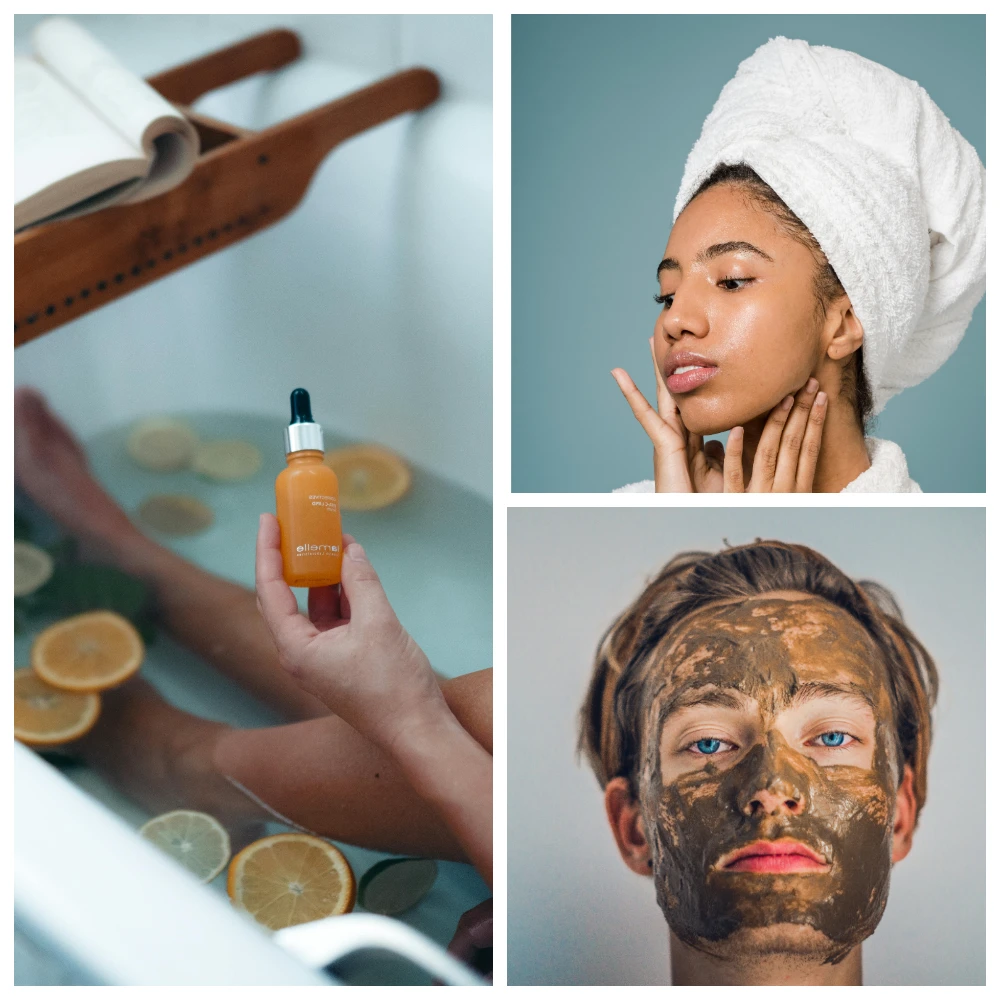Let’s be honest — who hasn’t looked in the mirror at least once and thought, “Ah, those were the days!” I definitely have. But here’s the interesting part: we actually have a lot more control over how fast our skin changes than we think. No, we can’t turn back time, but we can certainly slow it down.
That’s where antioxidants come in — our loyal allies in the fight for youthful, glowing skin. In this article, you’ll learn how they work, which ones are the most effective, how to combine them, and (the best part!) — discover real products you can start using right now.
Why Does Skin Age Prematurely?
Picture a typical day: the sun is blazing, you’re outside without a hat or SPF, you grab a quick meal, stay up late scrolling through your phone. Sounds familiar? For your skin, it’s a small disaster.
Inside your skin, free radicals — unstable, harmful molecules — start forming. They steal electrons from healthy cells, damaging membranes, proteins, and even DNA. Normally, your body has a defense system: antioxidants and enzymes that neutralize these “bombs.” But when harmful factors pile up, your protection fails, and oxidative stress begins — one of the key causes of premature aging.
Oxidative stress destroys collagen and elastin, triggers inflammation, and makes skin more vulnerable.
The takeaway: If you want to look younger, don’t just fight wrinkles — reduce oxidative stress and feed your skin antioxidants to support its natural defense system.
What Exactly Are Antioxidants and How Do They Help?
In simple terms, an antioxidant is like a kind knight — it gives its own electron to a free radical, neutralizing it without turning “bad” itself.
In your skin, antioxidants protect cells from damage, keep collagen and proteins intact, and preserve DNA health.
They come in two forms:
- Internal antioxidants – produced by your body (like enzymes and glutathione)
- External antioxidants – from food and skincare (vitamins, polyphenols, etc.)
As we age, our body’s natural “antioxidant factory” slows down. That’s why we need to support it from the outside — through skincare and nutrition.
And here’s the magic: antioxidants work better together than alone.
5 Antioxidants Worth Your Attention
I’ve picked five proven favorites — the ones dermatologists trust most. Here’s how they work and how to use them.
1. Vitamin C – Glow, Collagen, and Protection
The superstar of antioxidants! Water-soluble and highly effective, Vitamin C neutralizes free radicals, boosts collagen, and protects from UV damage.
How to use it:
- Topically: Look for serums with L-ascorbic acid (10–20%)
- Internally: Eat more fruits, berries, and vegetables rich in Vitamin C
Tips:
- Keep your serum in a dark, tightly closed bottle — Vitamin C degrades in light and air
- If you have sensitive skin, start with a lower concentration
- Combine it with Vitamin E and ferulic acid — they amplify each other’s effects
2. Vitamin E – The Skin’s Fat Shield
Unlike Vitamin C, Vitamin E loves lipids. It protects the fatty layers of skin cells from oxidation.
C and E are a dream team: Vitamin C helps Vitamin E regenerate and stay active.
How to use it:
- Choose creams and serums with an oil base that include Vitamin E
- If your skin is sensitive, be cautious with high concentrations
3. Coenzyme Q10 – Energy and Protection
CoQ10 is both an antioxidant and part of the cell’s energy system (mitochondria). Its level in skin drops with age, reducing elasticity and resilience.
Studies show that applying CoQ10 topically improves firmness and reduces wrinkles — especially when combined with other antioxidants.
How to use it:
- Apply night creams or serums containing CoQ10
- For best results, combine with Vitamins C and E
4. Resveratrol – Nature’s Shield
A polyphenol often linked to the benefits of red wine. It has strong antioxidant and anti-inflammatory effects, activates longevity genes, and supports mitochondrial function.
How to use it:
- In skincare: choose stabilized formulas (liposomal or encapsulated resveratrol)
- Internally: eat resveratrol-rich foods or take supplements (consult your doctor first)
Tip: Works best with CoQ10 or Vitamin C.
5. Glutathione – The Inner Protector
A peptide and one of the body’s most powerful antioxidants. It detoxifies cells, supports mitochondria, and regenerates other antioxidants.
Glutathione levels decrease with age, worsening skin health. Oral supplements don’t always work — they can break down in the stomach. Instead, support your natural production: eat foods rich in cysteine, B vitamins, and selenium.
Top Skincare Products with Antioxidants
Here are some dermatologist-loved antioxidant serums and creams worth trying:
- SkinCeuticals C E Ferulic — the gold standard (Vitamin C + E + Ferulic acid)
- La Roche-Posay Anthelios AOX Serum — antioxidants + SPF in one
- The Ordinary Resveratrol 3% + Ferulic Acid 3% — budget-friendly and effective
- Paula’s Choice RESIST Super Antioxidant Serum — with Vitamin C, Ferulic acid, and Q10
- CeraVe Vitamin C Serum — great for sensitive skin
- Drunk Elephant C-Firma Day Serum — potent daytime formula
- Vichy Liftactiv Vitamin C Serum — brightens and revitalizes skin
- ISDIN Flavo-C Ultraglican — praised for its balanced formula
How to Choose the Right Product
- Check the ingredient list — focus on key actives, avoid irritants
- Make sure packaging is airtight and opaque
- Start with one product to test your skin’s reaction
- Alternate antioxidants with active ingredients (like retinoids or acids) to avoid overload
How to Make Antioxidants Really Work
Even the most expensive serum won’t help if your lifestyle doesn’t support it. Here’s what truly matters:
- Morning: cleanse → antioxidant serum → moisturizer → SPF
- Evening: remove makeup → tone → antioxidant or active serum → night cream
- Always wear sunscreen — even the best antioxidants can’t replace SPF
- Sleep and rest — skin regenerates while you sleep
- Eat antioxidant-rich foods — veggies, berries, nuts, greens
- Stay hydrated — water helps nutrients reach skin cells
- Don’t overdo it — introduce actives gradually
In Conclusion
Skin aging isn’t a sentence — it’s a natural process that can be slowed down. Antioxidants are your best friends here: they protect skin, keep cells healthy, and fight visible aging.
Don’t expect overnight miracles. But with consistent use, good nutrition, enough sleep, and SPF, your skin will absolutely reward you — becoming brighter, firmer, and healthier.
FAQ
- Can I use all these products at once?
No — start with one, see how your skin reacts, then add others gradually. - Are expensive products always better?
Not necessarily. Formula quality matters more than price. - Morning or evening — when’s best to use antioxidants?
Usually in the morning for protection against UV and pollution, but some formulas work well at night too. - How soon will I see results?
After 4–8 weeks of regular use, you may notice more even tone, fewer red spots, and smoother texture. - Any risks or contraindications?
Yes — high concentrations may irritate sensitive skin. If you have health issues or take medication, consult your doctor first. - Can diet alone replace skincare?
Healthy food helps, but topical antioxidants deliver nutrients directly to skin — they complement each other. - When should I start using antioxidants?
The sooner, the better! Starting at 20–25 years old is perfect — think of it as an investment in your future skin.
You may also like:








